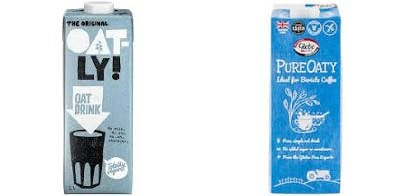About the author
Beverley Robinson is a senior associate trade mark attorney at Appleyard Lees IP LLP.
Beverley helps clients protect and manage their trade marks and designs, from initial concept and launch to policing and enforcement.
Beverley works with a broad range of clients from start-ups and SME’s to multinational corporations, across a wide variety of industries and has particular experience in the food and beverage and health and beauty sectors. Beverley’s practice includes pre-filing and strategy advice, filing and prosecution, and contentious matters such as oppositions, cancellations and policing and enforcement of rights.
Oatly loses battle of the oat drinks
The recent case concerning oat-based drinks OATLY and PURE OATY highlights the difficulties in enforcing rights in a descriptive trade mark against third parties. The case has attracted media attention and has been dubbed a “David and Goliath” battle, with the Claimant facing significant backlash for taking action against a small family-run business.
As part of the Chartered Institute of Trade Mark Attorneys “CITMA” marshalling scheme, I was invited to shadow the Judge throughout the trial, which provided a unique perspective of the case. From having counsel’s submissions presented in front of you to witnessing the cross-examination, and the opportunity to discuss the case one to one with the presiding Judge, it provided a real insight into the thoughts and considerations applied in reaching the decision.
Background
The Claimant in the matter is a Swedish company and the producer of the well-known OATLY products, a range of oat-based beverages. In 2020, Glebe Farm, a family-run farming company and the Defendant in this matter, launched an oat-based drink under the name PURE OATY. The Claimant issued court proceedings against the Defendant on the grounds that the name PURE OATY and the packaging of the product amounted to an infringement of its OATLY trade marks and passing off.

Trade mark infringement
Oatly claimed that there is a likelihood of confusion, arising from the similarity of the trade marks and the identity of the goods.
Whilst there is clearly some degree of similarity between the trade marks as a result of the common element “OAT”, this is the sole similarity and is entirely descriptive. It was therefore considered that the average consumer would see this element as having no significance in relation to the trade origin of the goods in question, and the Judge found that there was no likelihood of confusion.
In reaching this decision, it was noted that there was no evidence of any actual instances of confusion, despite the Defendant having carried out consumer research into adopting the name PURE OATY and having sold relatively large quantities of its product into outlets that had previously been supplied by Oatly, in addition to Oatly having over 300,000 followers on social media.
Oatly also alleged infringement on the grounds of reputation, its main argument being that by using a similar name, the Defendant was seeking to unfairly benefit from the Claimant’s reputation. As a result of the global boom towards a more plant-based and sustainable diet, the oat drink market has grown substantially over the last couple of years and, as one of the leaders in the marketplace with a net worth of over $10 billion, the Claimant’s reputation was not in dispute.
Whether the Defendant unfairly benefitted from the Claimant’s reputation came down to whether its product created a “link” with the Claimant’s product. Much of the evidence given in the trial focused on this aspect, and whether the Defendant purposefully set out to achieve this. The Judge accepted that use of the PURE OATY sign is likely to bring Oatly’s trade marks to the minds of many average consumers, even if only by virtue of it being an oat drink and Oatly’s importance in that market. However, given the low similarity between the marks, which is only present as a result of the word OAT, the Judge concluded that there is no unfair advantage to be gained simply by using elements of a mark that are descriptive, and ultimately ruled against Oatly’s allegation. Whilst the evidence submitted by the Claimant indicated that the Defendant was well aware of the Claimant’s products and may have taken note of the Claimant’s marketing strategy, the concept of unfair advantage does not seek to prevent a business from learning from its competitors and adopting similarities in approach.
Passing off
Passing off was also alleged by the Claimant, which argued that the Defendant’s product imitated the Claimant’s product by reproducing key elements including the name, colour, the type of language and typefaces and an image of a coffee cup. The Judge found that there was no misrepresentation by the Defendant in that consumers would not confuse the Defendant’s goods with those of the Claimant or be deceived into thinking that the two were connected in any way.










